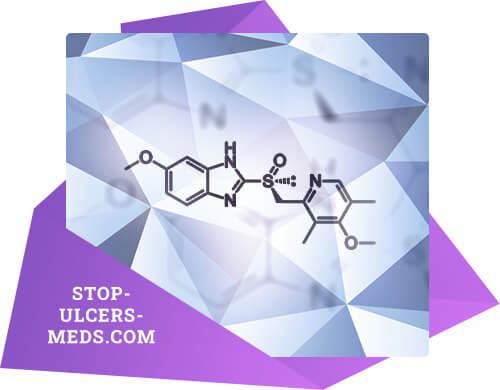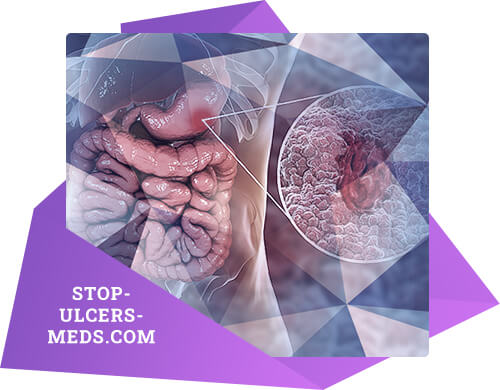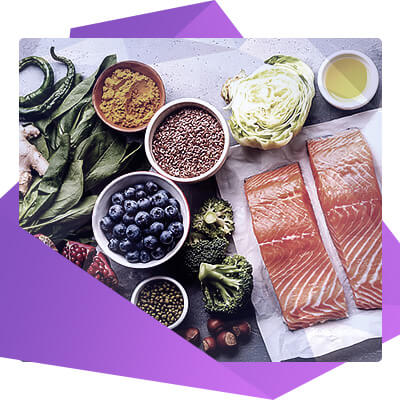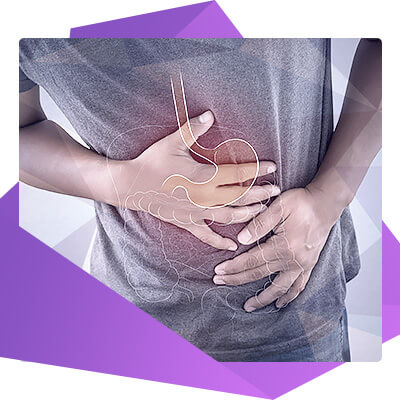Stomach ulcer is a chronic disease, characterized by local damage to the mucous membrane of the stomach. The disease is a recurrent type, during the disease alternates periods of remission and exacerbations. Healed ulcer leaves a scar on the mucous membrane, where no epithelium is formed. According to statistics, 70% of the disease precedents are men between twenty and fifty years. The disease is less frequently diagnosed in women and children.

Stomach ulcers are known of several types. The forms of peptic ulcer directly depend on the causes. Stress ulcers have been studied, where the main cause of the disease is stress (80% of cases). Medicinal ulcers are caused by taking certain medicines (10% of cases). Gastroduodenal ulcers of the stomach arise from metabolic and other endocrine disorders or diseases of internal organs (10% of cases). The listed diseases are symptomatic forms of stomach and duodenal ulcers.
Causes of the disease
Stomach ulcer has causes of development and occurrence.
Scientists have proved that the causes of stomach ulcer are recognized:
- The spiral bacteria living in the gatekeeper of the stomach is the main cause.
- Unhealthy lifestyle (smoking, alcohol).
- Genetic predisposition.
- Inappropriate diet.
- Psychosomatics (emotional disorders, stress).
- Chronic stomach diseases (pancreatitis, gastritis).
- Metabolic disorders.
- Reception of individual medications.
The bacteria living in the gatekeeper of the stomach, is responsible for the ulcer in 95% of cases. The microorganism causes gastritis, cancer. The bacterium causing stomach ulcer is transmitted from the carrier to an outsider in a domestic way, the microbe is quite easy to catch - when kissing, using common cutlery.
Unhealthy lifestyle provokes the development of bacteria, is the root cause of the disease. Smoking and alcohol create favorable conditions for the development of stomach ulcer.
Genetic predisposition means that the disease is embedded in the human genome; under favorable conditions, the disease will "wake up". Scientists continue to argue why an ulcer appears.
In case of improper nutrition there is a violation of the ratio of enzymes and mucus produced by the stomach. As a result, the mucus can not cope with the protective function, enzymes, among these and hydrochloric acid, have a devastating effect on the walls of the stomach, provoking the ulcer.
Psychosomatics plays a huge role! In a normal emotional state, the human body is rarely at risk of disease. Under stress, there is a disturbance of the nervous system, causing muscle spasms, resulting in a negative effect of gastric juice on the mucous membrane of the stomach walls, provoking the emergence of ulcers.
Gastritis and pancreatitis are defects of the mucous membrane of the stomach. If you do not take control of the disease in time, here are added the other causes of ulcer, diseases of the stomach and duodenum cannot be avoided.
Among the metabolic disorders are endocrine diseases, such as diabetes mellitus. In such violations, there is an inadequate diet of internal organs, which leads to pathologies.
Selected medicines have a bad effect on the mucous membrane of the stomach, provoking the production of acid that destroys the mucous membrane.
The main causes of stomach ulcer are listed, based on which doctors diagnose and prescribe treatment. When diagnosing the disease, doctors must take into account the signs of the disease to prevent the possibility of making the wrong diagnosis.
Symptoms of the disease
The symptoms of peptic ulcer of the stomach and duodenal ulcer are diverse, similar to the symptoms of other diseases, together signal the occurrence of ulcer. There are signs of disease: pain, heartburn, burp, nausea.
Symptomatic peptic ulcers of the stomach and duodenal ulcers are diagnosed without difficulty. The manifestation becomes an occasion to start the examination. Causes and signs of ulcers are similar to other diseases of the gastrointestinal tract, after passing the examination, the diagnosis is confirmed or removed.
It should be remembered that symptoms of stomach ulcer in the early stages of the disease are sometimes expressed implicitly.
Pain syndrome
Pain is a protective reaction of the brain to the body's dysfunction. In gastric and duodenal ulcer pain occurs due to the action of gastric juice directly on the muscle, overcoming the barrier that forms the mucous membrane.
In case of a stomach ulcer, the pain is concentrated in the upper abdomen, reminiscent of a hungry stomach. If a person eats food, drinks a drink, the pain recedes. True, not for long. Stomach ulcer pain syndromes are divided into three types:
- Early pain syndrome (occurs immediately after eating. As the food is digested, the pain recedes. This kind of pain syndrome is typical for an upper stomach ulcer).
- Late pain syndrome (occurs within two to three hours after meals, is typical for an ulcer in the lower part of the stomach).
- Hungry pain (occurs in the empty stomach, on an empty stomach, signaling the localization of peptic ulcer in the duodenum).
Occasionally a mixed pain syndrome appears - indicates the location of an ulcer "at the junction" of the two parts of the stomach and duodenum.
Heartburn
This is a reaction of the esophagus to gastric juice - is a burn of the esophagus with hydrochloric acid. Stomach ulcer is manifested in the form of heartburn.
Heartburn in gastric and duodenal ulcer occurs for a number of reasons:
- High acidity.
- Decrease in the contractile function of the stomach and duodenum.
- Congestion of food.
If the cause of heartburn is high acidity, eating and excretion of gastric juice, the mucous membrane of the esophagus is severely damaged, provoking heartburn.
If the cause is a decrease in the contractile function of the stomach or duodenum, the eaten food lingers in the stomach longer than necessary, the active secretion of gastric juice begins to quickly digest food, causing heartburn.
Food stagnation occurs when the duodenum - stenosis - narrowes, when the eaten food can not go further along the gastrointestinal tract. The described causes heartburn, burp, vomiting.
Often, heartburn is accompanied by pain or burning in the chest area.
Nausea
The first indicator of the disease. Nausea can signal not only about an ulcer. For example, pancreatitis, gastritis, stomach upset - the disease is also accompanied by this symptom. The state of nausea is observed during pregnancy in the first trimester.
Inflammatory processes of the stomach have similar symptoms, to diagnose specifically ulcers help associated signs of disease and the time of nausea. In case of gastric and duodenal ulcer, the symptom is due to the consumption of fat, fried, spicy foods or as a result of overeating. Nausea is a reaction of the stomach to spasm.
More often it occurs on an empty stomach or immediately after eating, accompanied by severe drooling, acute pain in the stomach area.
Loss of appetite
Reduced or lost appetite for stomach ulcer is not uncommon. It is more a psychosomatic symptom, the human brain in response to the constant pain of eating stops to signal hunger, avoiding the subsequent pain. Loss of appetite is a symptom of depression or brain reaction to a certain event (loss of loved ones, conflict at work or at home). The sign indicates that the patient has a stressful stomach ulcer.
If the loss of appetite is not caused by other diseases (anorexia) and is not a reaction to the emotional state, the loss of appetite should be stopped, anticipating the decline of strength.
The human body is wise at the level of instincts, a little starvation is useful for an ulcer, reducing the load on the digestive system. If the appetite is not returned, it is necessary to take action.
One way to regain your appetite is to eat strictly by the hours. After a while, the body will get used to eating at a certain time, starting to require a portion.
With a stomach ulcer, you can't stimulate the production of gastric juice to wake up your appetite. This is fraught with a perforation of the stomach.
Burp
Frequent reaction of gastrointestinal tract to food intake. During the digestion of food in the stomach gases are formed, coming out through the mouth. The phenomenon is not dangerous, may signal a disturbance in the stomach and intestines. For this reason, the patient often does not perceive burp as a manifestation of ulcer.
When the gastrointestinal tract is disturbed, more gases are formed, bloating, burp and flatulence occur. Periodically, a small volume of gastric juice or stomach contents is released during a burp.
In determining the disease with the symptom of a burp, the flavor left in the mouth is important after the gas leaves the stomach through the mouth. The taste of rottenness is characteristic of slow digestion, a bitter flavor indicates disorders of the biliary tract, sour taste signals increased acidity, gastritis and ulcer disease.
If there is a sour taste after burp, the symptom is accompanied by pain and nausea - there is a disease of the gastrointestinal tract.
Meteorism
Developed increased gas formation in the stomach. Gaseous formation is not dangerous, gases and should be formed in the stomach if digested correctly. When gases are produced in large quantities, the process leads to frequent belching and bloating. Meteorism is accompanied by unpleasant, often painful sensations.
Meteorism becomes an independent disease, a reaction of the body to the type of food (beans, food with high starch content, baked goods, individual dairy products). Provided that the increased gas formation is accompanied by other symptoms of peptic ulcer, doctors diagnose stomach ulcer.
Stomach heaviness
An unpleasant feeling of heaviness in the stomach usually occurs after eating heavy food, when overeating. The cause of this condition is sometimes psychosomatics. A single sensation is not dangerous; if it occurs, it is enough to take a pill of medicine to help digestion. If the heaviness in the stomach does not go away, is accompanied by other symptoms - there is a signal of gastrointestinal disorders, a possible stomach ulcer.
Seizure disorders
Stomach ulcer disorders are important in the diagnosis of gastric ulcer. The doctor must determine whether there is internal bleeding. Usually this is signaled by a black stool. If the black color of excrement is described in the treatment protocol, the attending physician must make sure that the blood loss is directly related to bleeding of the stomach or duodenum.
Black feces with a stomach ulcer is accompanied by vomiting with blood. With heavy bleeding, chalk is viscous, resembling tar, with a slight loss of blood, the chair is decorated, due to the lack of reactive promotion of split blood in the intestine.
Complications of stomach ulcer
In case of incorrect or inadequate treatment of ulcer disease develop various complications of the disease. Most of the complications lead to surgical intervention, even fatal.
Penetration
A frequent complication of peptic ulcer is penetration of the ulcer. This means that the peptic ulcer spreads to the tissues of nearby organs. In fact, there is destruction of tissues of the stomach wall, the role of the wall takes the nearest organ to the ulcer site.
The pancreas is most often affected, the ulcer can affect the liver, gallbladder and other internal organs, depending on the location of the ulcer. Hydrochloric acid corrodes the tissues of the internal organ, leading to its destruction.
When penetration increases the pain syndrome, which ceases to depend on meals, begins to have a permanent character. The body temperature rises. In the blood test increases the level of alpha-amylase. There are 4 degrees of penetration:
- The first stage (partial destruction of the stomach wall and duodenum).
- The second stage (destruction of the wall of the stomach and duodenum without the exit of the ulcer process, the formation of the internal body with the stomach and duodenum).
- The third stage (complete destruction of the wall of the stomach and duodenum, the spread of ulcers on the surrounding organs with the formation of defects, sealing the affected organs, the deformation of the stomach and duodenum).
- The fourth stage (formation of deep cavities in nearby organs, formation of inflammatory tumor).
Perforation (penetration) of the stomach
Perforation of gastric ulcer is the most severe complication of the disease, leading to inflammation of the abdominal cavity.
Perforation of the stomach may be formed due to lack of proper nutrition of the edges of the ulcer, causing necrosis and dying of tissue cells. There is a rupture suddenly, it develops reactively. The catalyst for rupture sometimes becomes psychosomatics - stress, experiences. Such is the danger of complications - it is impossible to predict when the lesion will occur, whether it will be possible to localize the development of pancreatitis.
Bleedings
Severe complication of peptic ulcer - bleeding. In gastric ulcer small blood loss - normal course of the disease. In some cases, there are bleedings, which are the cause of death. Usually, bleeding opens from a destroyed artery, less often from the capillaries and veins of the stomach. This can occur in the absolutely safe course of the disease, the blood can not be stopped. If it is impossible to provide rapid medical care, the patient's death comes.
Highlight the causes of the opening of the bleeding:
- Incorrect diet of the patient;
- Ineffective treatment of the disease;
- Infection;
- Mechanical damage;
- Peritoneal overvoltage;
- Aggressive drugs or food;
- Lack of treatment in case of disease exacerbation.
Gatekeeper stenosis
Stenosis of the gatekeeper in gastric ulcer means the narrowing of the transition point of the stomach to the duodenum, occurs after the formation of scars of the ulcer.
With the formation of stenosis, food stagnates in the stomach, without being able to go further to the 12 duodenum. Vomiting begins.
Stenosis is divided into three stages:
- The first stage - compensated. The passage between the stomach and intestines is slightly blocked. It usually covers the ulcerous scar. Compensated stenosis is characterized by feelings of heaviness in the stomach, burp with a sour taste, the patient's general condition is satisfactory.
- The second stage is subcompensated. The passage between the stomach and duodenum is half blocked. Food stagnates in the stomach, but has the ability to pass through the intestine. There is a constant feeling of heaviness in the stomach, there is a pain syndrome, after eating the patient vomits, which makes the condition easier. The patient begins to lose weight.
- The third stage - the decompensated stage. At this stage of stenosis, the passage between intestine and stomach is almost completely blocked. Food is accumulated in the stomach, not being able to pass into the intestine. Vomiting is increasing. The patient's stomach is severely stretched, the body is extremely dehydrated and exhausted.
Malignization
Malignization of a stomach ulcer means the formation of malignant tumors in the stomach, leading to the development of stomach cancer. It is rare. The causes of gastric ulcer in cancer have not been fully investigated.
With the described complication worsens the patient's general condition, the patient loses appetite, refuses to meat, burping, nausea, vomiting becomes more frequent. The painful syndrome changes its character, ceases to depend on meals and becomes enduring. The patient has exhaustion, weakness. Without medical assistance, malignization of NSA leads to imminent death.
Diagnosis of the disease
The first signs of a stomach ulcer appear early, at the primary stage it is difficult to detect the disease. Diagnosis occurs in several stages. Initially, the patient needs to give blood, urine and feces for analysis. In the general blood test revealed anemia, low erythrocyte count - signs of inflammation. The patient also gives feces for the detection of hidden blood. Diagnosis of stomach ulcer in the early stages is to detect a reaction to Helicobacter pylori.

The second stage of the diagnosis is to examine the stomach and duodenum mucosa by fibrogastroduodenoscopy, which helps to see the image of the ulcer on the screen. Patient is injected into the stomach tube with a camera, examine the walls of the stomach and 12 duodenum for an ulcer. At this stage, the doctor watches how the stomach ulcer looks like and takes materials for biopsy analysis.
The next step is an ultrasound examination of internal organs to identify the inflammation center and make the right diagnosis.
Then they monitor the pH of gastric juice for 24 hours. This stage of diagnosis is the most painful and unpleasant, the doctor determines the degree of aggression of gastric juice.
It is necessary to take a test for Helicobacter pylori as soon as possible. This is a bacteria that causes stomach ulcer.
At the stage of diagnosis, symptoms and treatment of the ulcer are established.
Treatment of the disease
Several different approaches are known in the treatment of gastric and duodenal ulcer. Many solve the symptoms of stomach ulcer in adults and children. It is impossible to quickly cure a stomach ulcer, the body takes a long time to repair damaged tissues. It is not possible to treat peptic ulcer with a single drug.
How to treat gastric ulcer is decided by the doctor, a number of general directions are provided. A comprehensive approach is needed in the treatment. Upon detection of the bacteria causing the ulcer, the microbe is removed from the body in the first place. During the treatment of gastric ulcer, the doctor should take into account the symptoms of manifestation. After that, drugs are prescribed to reduce the excretion of gastric juice to allow the walls of the stomach to notch. What kind of drugs it will be, the doctor decides, given the history of the disease.
The next step is to relieve inflammation and stimulate tissue regeneration, especially in acute ulcers. Treatment of gastric and duodenal ulcer is under doctor's supervision, ideally - in the hospital. In difficult and controversial cases, the consilium of doctors decides how the patient can be cured.
Antibiotic therapy
The therapy is aimed at expelling Helicobacter pylori. Antibiotics from penicillin and tetracycline classes are prescribed for treatment. The difficulty is that it is impossible to get rid of the bacteria completely: once settled in the stomach, the microbe is able to "hibernate". The cured patient with a stomach ulcer caused by the bacteria is prone to relapses. For this reason, a patient with a bacterial form is prescribed regular prophylaxis and treatment of ulcer.
Medicament therapy
In this treatment, drugs are prescribed that increase the resistance of the mucous membrane to gastric juice, included in the complex treatment.
These are medicines containing sucralphate, carbenoxolone, bismuth subcytrate, entrostyl and other substances. The drugs help in the destruction of Helicobacter pylori, which produces ulcers, in the regeneration of damaged cells.
Anti-secretory agents are assigned:
- Antacids.
- Proton pump blockers.
- Blockers of histamine receptors.
- Cholino receptor blockers.
- Prostaglandin analogues.
Naturally, medications that relieve spasms, improve gastrointestinal motor function, sedatives and antidepressants are used in the treatment of ulcer disease.
The full course of treatment takes from two weeks to one and a half months. The attending physician takes into account the treatment protocol, symptoms and condition of the patient. An important role is given to the observance of diet by the patient. Remember, it is much easier to prevent the disease than to treat it. Bless you!
Many workaholics do not think that dieting in a hurry and dry state can provoke such an unpleasant disease? like a stomach ulcer, symptoms of the disease are manifested by pain under the spoon, nausea, heartburn and other painful feelings. It is not easy to treat a stomach ulcer, it is a long and complex activity, which should take place exclusively under the control of a doctor. Otherwise, life-threatening complications develop: bleeding, ulcer perforation or malignant tumor formation.
Reasons for the pathology
The main reasons for the formation of a small or deep mucous membrane flaw in the stomach wall - infection with the microbe Helicobacter pylori. At first, the bacterium provokes gastritis, but without appropriate treatment it turns into an ulcer disease.
Doctors call the reason of rivalry the imbalance between the mechanisms that protect the stomach, and aggressive factors. As a protection against highly acidic gastric juice and enzymes, the mucous membrane that lays down the organ produces mucus. However, under the influence of some factors the acidity of gastric juice increases sharply, so the protective mechanisms do not work, and an ulcer appears in the stomach wall.
The main reasons for the increase in acidity of gastric juice is considered:
- Frequent consumption of spicy, sour, hard, marinated, irritating food, including the abuse of fast food. Such products stimulate the secretion of gastric juice, and also lead to the possible formation of inflammation and erosion of the mucous membrane of the stomach.
- Feeding in a hurry and dry.
- Alcoholic drinks and smoking.
- Unregular diet.
In addition to the above, ulcer disease occurs as a result:
- Excessive acidity of gastric juice.
- Hereditary factor.
- Acute or chronic gastritis.
- Nervous tension and stress, provoking the so-called "stress" ulcers.
- Reduced immunity.
- The consumption of too hot and cold food, fried, smoked, spicy dishes and seasonings, carbonated beverages and purchased semi-finished products.
- Survived earlier blood loss, burns of 2-3 degrees and injuries (so-called "shock ulcers").
- Prolonged use of drugs that have a destructive effect on the lining of the stomach - drugs containing glucocorticosteroids, such as Prednisolone ("steroid" ulcers), non-steroidal anti-inflammatory drugs (Ibuprofen, Acetylsalicylic acid) and others.
Signs of stomach ulcer
To not miss the beginning of the disease, you need to know the symptoms of a stomach ulcer. This will make it easier to seek medical help before the mucous membrane defect is still not so deep. In this case, there are many chances that you can do in a conservative way and avoid surgery and long recovery.
As practice shows, in 25-28% of cases, the disease does not show any signs of disease, so it is very important to be regularly examined for preventive purposes. It is unlikely that your relatives will feel better when they learn that the death was caused by a stomach ulcer.
If you have one or more of the following symptoms, see a doctor:
- Pain localized in the upper third of your abdomen. This symptom occurs in 3/4 cases. Half of the patients with ulcers have low intensity of pain, and the rest have a pronounced pain. Stomach ulcer pain may increase with physical stress, after alcoholic beverages, spicy or irritating food, with long intervals between meals.
- Heartburn. The patient may feel burning in the epigastria or behind the sternum. Throwing acidic content of the stomach leads to the erosion of the walls of the esophagus, which is accompanied by unpleasant sensations. This symptom is observed in the vast majority of patients. Heartburn manifests itself on average 2 hours after a meal.
- Nausea. In some cases, nausea is inextricably linked with vomiting. It occurs 2 hours after meals. After vomiting, the person feels better, so some patients cause vomiting themselves. These phenomena develop due to a disturbance of the motor skills of the organ, which is characteristic of stomach ulcer.
- Deterioration of appetite. Constant pain, nausea or vomiting cause the patient to fear repeated suffering, which naturally reduces the appetite. Loss of appetite may also be associated with gastrointestinal dysfunction.
- Burp is the exit of accumulated or gastric gases through the mouth. They come out together with some acid and digestible food. At the same time, the person feels a sour or bitter taste in the mouth.
- Intense gas formation - flatulence.
- The feeling of heaviness in the stomach after eating.
- Too fast saturation during meals.
- Marked decrease in body weight. It is due to poor appetite and constant pain.
- Constipation. Half of patients with peptic ulcer have frequent constipation.
In many patients the signs of a stomach ulcer are supplemented by plaque on the tongue, which signals problems in the digestive system. Among other things, the patient feels pain when pressing on the epigastric region. He may have an increased sweating of the palms.
Diagnostic measures
During the consultation, the doctor will certainly ask the patient about the presence of stomach pains and their connection with eating. It is important information about the seasonality of exacerbations, when they occur in spring or autumn, and with what the patient is associated with the emerging symptoms of gastric ulcer.
To compile an anamnesis you need information about whether the patient has ever had diseases of the gastrointestinal tract - gastritis, duodenitis, and others. The doctor will definitely ask if anybody in the family has such complaints about health, because infection with Helicobacter pylori bacteria may occur from another person when kissing, using common dishes and cutlery.
Then the patient will be referred for a general urine and blood test. Elevated levels of white blood cells and SOE are characteristic of the inflammatory process. To find out if there is no bleeding in the digestive system, do a stool test for hidden blood.
Of great importance are instrumental examinations: stomach acidity, detection of Helicobacter pylori and endoscopic examination of the stomach. Esophagogastroduodenoscopy is an injection through the esophagus into the stomach and duodenum of special endoscopic equipment, equipped with a miniature camera and tools for biopsy.
During the procedure, the doctor examines all mucous membranes up to the duodenum for ulcers, their location and number.
If necessary, take a biopsy - a piece of suspicious mucous membrane. This sample is sent for cellular examination.
Indirect sign of Helicobacter pylori presence is an exhalation of urea. For this purpose, a respiratory radionuclide urease test is performed. In addition, blood and faeces can detect antibodies to these pathological bacteria.
Methods of treatment
In medicine, there is no universal treatment scheme for stomach ulcer. In prescription, the doctor takes into account the age of the patient, his physiological condition, the presence of other diseases of the gastrointestinal tract - gastritis, duodenitis, colitis, etc. Symptoms and treatment of peptic ulcer may vary depending on the severity of signs, whether it is pain, nausea or vomiting. The main thing that the treatment of this disease should be a gastroenterologist. Very often, when the patient muffles the stomach pain with painkillers and delays a visit to the doctor, the stomach ulcer opens, the contents of the stomach is poured into the peritoneum, infection begins, eventually a person dies. To prevent this from happening, it is important to see a doctor in time at the first signs of stomach and digestive problems.

The pathology is treated with a whole complex of measures.
Diet and proper nutrition. To begin with, you should completely eliminate alcohol, coffee, very hot and cold food, hard meat, mushrooms, spicy, fried, salty, smoked and pickled dishes, seasonings - horseradish, mustard and wasabi.
During the day you should eat in small portions at equal intervals of about 3-4 hours. Soft and grated food, a variety of porridges, vegetable soups and mashed potatoes, steam omelette, etc. is preferable. For better ulcer healing, the food should include a large amount of vitamins and proteins.
Medicines. Medicament therapy, consisting of several groups of drugs, is selected individually for each case. Antibiotics to destroy Helicobacter pylori. For this purpose, the following types of antibiotics are used:
- Macrolides (Clarimicin);
- Penicillins (Amoxicillin);
- Nitroimidazole (Metronidazole).
Reducing acidity of gastric juice to eliminate heartburn and pain. Can be prescribed for this purpose:
- Proton pump inhibitors (Pariet, Omeprazole, Pantoprazole, Rabeprazole, Exomeprazole, Nexium). They prevent the increased production of hydrochloric acid and block the proton pump.
- H2-histamine receptor blockers (Roxatidine, Ranitidine, Nizatidine, Famotidine, Quamatel). Now, these drugs are almost not prescribed because after their elimination, the symptoms of gastric ulcer return.
- Antacids (Maalox, Almagel, Sucralphate, Keal) envelop the stomach walls, thus eliminating the corrosive effect of hydrochloric acid.
- Bismuth preparations (De nol) are designed to destroy Helicobacter. They also have astringent and gastrocytoprotective effects.
- Synthetic analogs of prostaglandin E1 (Saitotec, Mizoprostol) are designed to increase mucus and bicarbonate production, as well as to reduce the production of hydrochloric acid.
- Means blocking M-cholinoreceptors (Gastrocepin, Buskopan, Pyrenzepin). These drugs help eliminate stomach ulcer pain by reducing the production of hydrochloric acid.
Depending on the severity of symptoms, test results and the severity of the condition, the doctor will prescribe a therapy consisting of 3-4 drugs of different pharmaceutical groups. If the tablet form of drugs is poorly taken by the body, the doctor may recommend the injection.
Surgical intervention. The operation is performed in critical situations - when the ulcer opened, began to bleed gastrointestinal, developed obstruction of the lower part of the stomach. During the operation, the resection of individual parts of the stomach or the intersection of nerves that stimulate the gastric secretion is performed.
Prophylaxis
Stomach ulcer may be reminiscent of relapses, in order to prolong periods of relative prosperity, you must take preventive measures.
Prophylaxis includes:
- To cure sick teeth, if necessary, to restore the missing ones. Such measures should guarantee the full chewing of food.
- Create a calm psychological environment at home and at work.
- Quit smoking and forget about alcohol.
- Provide yourself with a full night's rest for 6-8 hours.
- Avoid fried, spicy, salty, smoked, canned and fatty food, very cold and hot dishes.
- In case of exacerbation, immediately see a doctor and switch to a 5-6-times diet food.
Stomach ulcer is a very unpleasant chronic disease, which is manifested not only by pain in the epigastria, but also by constant nausea, vomiting, bad smelling burp and annoying heartburn. The symptoms of stomach ulcer reduce the appetite, and a person ceases to enjoy the food. It is not worth dropping inflammatory diseases of the 12th colon and stomach. Symptoms of these diseases can quickly degenerate into manifestations of stomach ulcer, and later into life-threatening complications.
Stomach ulcer is a pathological state of its mucous membrane, characterized by the formation of trophic disorders (ulcers) on its surface. Inflamed mucosa signals the disease with attacks of pain and digestive disorders with concomitant unpleasant symptoms.
It usually has a prolonged chronic character with periods of remission. In the neglected form can provoke a serious complication (malignant formation, bleeding, rupture, etc.).
Stomach ulcer must be treated. Early diagnosis, an effective and competent treatment program by a doctor, the clear implementation of recommendations for treatment and prevention of the disease by the patient will allow to get rid of the disease completely.
Mechanism and causes of stomach ulcer
A healthy body has a balance between hydrochloric acid, which is involved in digesting food in the stomach, and its protective shell.
But under the influence of some or other negative factors there is a malfunction, the result of which is the weakening of the protective layer and exposure of the stomach walls to aggressive acid.
As a result, there is inflammation and formation of erosion, and then ulcers. At one time, a stomach ulcer was considered a disease of people exposed to constant stress.
Chronic nervous tension is indeed one of the causes of the disease, but not the only one. Along with it, it is isolated:
- Bacterial. Infection of the body with Helicobacter pylori bacteria through saliva, dirty dishes, contaminated water; can be transmitted from mother to fetus;
- Medicamentous. Occurs as a side effect of taking medicines: non-steroidal anti-inflammatory drugs, corticosteroids, potassium cytostatics and others;
- Chronic diseases: tuberculosis, pancreatitis, cirrhosis of the liver, bronchitis, diabetes;
- Acute diseases (stressful effects on the body): injuries, burns, frostbite, sepsis, liver and kidney failure;
- Social: heredity, poor nutrition, chronic fatigue, bad habits, financial insecurity.
Highlight the following stages of the disease:
- Active;
- The stage of healing;
- Scarring stage;
- The stage of remission.
Symptoms of stomach ulcer
The disease is characterized by the following manifestations:
- Pain in the upper abdomen (left sternum, arm, back, less often in the right pelvis, lower back): cutting, stabbing, pulling or stupid; depending on the degree and nature of the injury - a strong, acute (prolonged) or mild (short-term); occurs on an empty stomach or in the first two hours after meals, there are night seizures of pain, the so-called seasonal autumn-spring exacerbation;
- heartburn;
- Heaviness;
- bloating;
- Rapid saturation;
- constipation.
- Chronic (neglected) form of ulcer may cause serious complications:
- Destruction of the stomach walls with subsequent defeat of the neighboring organ;
- Destruction of the walls of the stomach with the entry of its contents into the abdominal cavity;
- The outgrowth of the ulcer into malignancy;
- Narrowing of the narrow part of the stomach with repeated opening and scarring of the ulcer with subsequent impassability of food of varying degrees;
- Gastrointestinal bleeding (black stool, vomiting masses of coffee color).
If you have any alarming symptoms, you should consult a gastroenterologist. The doctor will prescribe the necessary tests:
- OAC: increased COE, reduced hemoglobin and red blood cells;
- FEGDS - procedure of internal examination (taking the material for biopsy) of the stomach mucosa with a fibrogastroscope;
- X-ray diffraction;
- Stomach juice analysis.
Treatment of stomach ulcer
Taking into account the possibilities of modern medicine in the diagnosis and treatment of gastric ulcer, the probability of complete recovery from the disease is very high: 96 cases out of 100.
Only a small number of patients can not finally cope with it. At later detection and chronic course of the disease recovery is possible only after surgical intervention.
The necessary condition for successful treatment with the achievement of a lasting positive result is a comprehensive approach. The patient must be patient (this is not a fast process) and be ready to follow the clear recommendations of the attending physician.
The obligatory standard treatment scheme includes: taking medications to eliminate the main cause of the disease and its associated symptoms, strict diet and preventive measures.
Medicament treatment
Antibiotics are prescribed for positive results of Helicobacter pylori examination:
- Clarithromycin, Amoxicillin, Tetracycline, Metronidazole and others. If necessary, the course of treatment is repeated until the complete elimination of the causative agent;
- Anti-secretory drugs (to reduce hydrochloric acid production): "Almagel", "Maalox", "Rinit", "Omeprazole" and others;
- To protect and restore the mucous membrane of the stomach: "Enprostil", "Sucralphate", "De nol", "Biogastron", and others;
- To ease the general condition and to eliminate the concomitant symptoms;
- To improve stomach motor skills - "Motilium", "Cerucal";
- for pain relief - "No-Spa", "Drotaverine";
- to restore intestinal microflora - "Bifiform", "Linex".
Diet for ulcer disease
A special diet is prescribed to increase the effectiveness of medication treatment and to consolidate a stable positive result:
- A meal in small portions, five or six times a day;
- Food is cooked or steamed: in particular, the meat must be well cooked on slow fire;
- Optimal food temperature - not above 65 and not below 15 degrees;
- Food should not overload the stomach either mechanically or chemically, processed with a minimum allocation of gastric juice, and therefore should have a liquid (semi-liquid) and crushed consistency;
- The diet menu must be balanced and include products of both animal and vegetable origin;
- Recommended: rice, oatmeal, semolina; all types of lean meat (veal, turkey, chicken, beef, rabbit); egg white without restriction (yolk no more than 2-3 pieces per week); fish seafood, butter, cottage cheese, honey, kissel, fruit compote and mousse;
- The following should be discarded: spicy, fried, fat, salty and smoked; canned food, coffee, cocoa and tea, spices and spices, ketchup, mayonnaise; cabbage, tomato, bean, citrus, radish, bread, fatty meat broths; pickles, carbonated drinks, candies and other sweets;
- Compliance with drinking regime (clean raw water in large quantities);
- Under a ban of alcohol and cigarettes.
Traditional medicine has proved to be an effective remedy for stomach ulcer and to relieve its concomitant symptoms. Taking herbs is an affordable support therapy at home:
- Reception of herbal infusions: strawberry and apple leaves, flax seeds, rose hips, yarrow, licorice root and chamomile;
- At heartburn well help: soda, carrot juice, all kinds of nuts, milk;
Honey - a universal therapeutic natural product with disinfecting and anti-inflammatory properties. Ways of use:
- 300 g. honey is baked in an oven with walnuts and butter. Take it clean (without drinking) three times a day 30 minutes before meals;
- Honey - 250 g., crushed aloe leaves - 250 g. Mix, boil for 5 min. at 50 degrees with a constant stirring. After adding 500 g of homemade red wine, and the resulting infusion is removed for 7 days in a dark place. Take three weeks 3 times a day: the first 7 days - on a teaspoon, the rest - on the dining room;
Potatoes - a natural remedy to reduce acidity, muffle the pain symptom and regenerate the damaged stomach mucosa:
- Pure potato juice taken for a month on an empty stomach (an hour before the first meal);
- Freshly squeezed potato and carrot juice in a ratio of 1:1 (take within two weeks, you can feel the improvement in two days after the start of the meal);
Blindness with its wound healing properties is also recommended for treatment and prevention of disease:
- Taking sea buckthorn oil within four days will help relieve unpleasant symptoms: heartburn and burp;
- For better regeneration of the damaged mucosa take: a bottle of sea buckthorn oil and 1/4 cup of soda solution (2%) three times a day with a teaspoon half an hour before meals;
Plantain. Pharmacological properties: antiseptic, promotes rapid blood clotting, has high regenerating characteristics. Helps with gastric pain, improves appetite, eliminates inflammatory processes in the intestines. Methods of administration:
- Juice plantain leaves and honey in the proportion of 1:1 (take for a month on a tablespoon of the composition of 30 minutes before eating);
- Take dried plantain leaves and sage (one tsp), pour 0.5 liters. of boiling water, cook for 5 minutes, let insist. Take half a glass once a day for 1.5 weeks, then increase to 3 times a day;
- Useful in fresh form: 10-12 leaves per day (can be with honey);
- Plantain seeds to reduce the painful symptom: pour 2 tbsp. seeds 1.5 glasses of boiling water, let stand for 1.5 hours in a dark place;
- Vegetable soup with plantain leaves. Potatoes, carrots, onions, rice and chopped plantain leaves tossed into boiling water, cook until ready, let to infuse.
- Plantain leaves can be added to regular tea.
Meanwhile, it is necessary to take into account the recommendations and possible contraindications in the use of herbs as a therapeutic treatment for stomach ulcer:
- The medications should be used in alternating sequence;
- Start in conjunction with medication therapy;
- In the future, it will be sufficient to leave this method as a prevention and to keep a diet;
- Apply as a must in the period of autumn-spring exacerbation;
- It is recommended to consult with your doctor before use to identify possible contraindications and allergic reactions;
- Admission of natural remedies should be stopped in case of exacerbation of the main symptoms of the disease and consult a specialist.
General preventive measures in case of ulcer disease:
- Complete sleep (at least 6 hours);
- Complete and balanced nutrition, diet adherence;
- Healthy lifestyle (exclude alcohol and cigarettes);
- Avoid stress and nervous overvoltage.
- It is obligatory to observe in case of hereditary predisposition to the disease.
Attention to your health, timely medical examination at the detection of symptoms of the disease, the use of the above methods of treatment in the complex will completely get rid of stomach ulcer.
In recent decades, diseases of the digestive organs are becoming more common. The stomach is under a heavy load due to sedentary lifestyle and poor diet. In addition, people use a large number of medicines, and the developing food industry creates many unhealthy foods. All this has led to the fact that the signs of gastritis and stomach ulcers are very common in people. Not only the elderly, but also young people, and even children experience stomach pain, dyspepsia, and heartburn. For many people such symptoms have become common, and they do not go to doctors, coping with them on their own. But such an attitude can lead to sad consequences. Therefore, you should not procrastinate with a trip to the clinic, and go to the doctor as soon as you notice signs of ulcer and gastritis.
Features of these diseases
Modern way of life requires a more attentive attitude to one's well-being. Sometimes signs of gastritis and stomach ulcers are taken for common malaise or food poisoning. Why shouldn't they be left without attention? Gastritis inflames the stomach mucosa, which is accompanied by a violation of its secretory function. This leads to a violation of digestion of food. In addition to unpleasant sensations, the process can lead to a lack of nutrients in the blood. In addition, without treatment, this inflammation does not pass, but only develops, because food constantly enters the stomach, irritating the inflamed mucosa. Gastritis becomes chronic, and if a person continues this way of life, then an ulcer occurs. This disease is a long term: periods of exacerbation are replaced by remission. Some at this time, even no symptoms of stomach ulcer are observed. Signs of it are manifested only during exacerbations. But without treatment of an ulcer may develop serious complications, up to and including cancer.
Causes of stomach diseases
- Chemical poisoning.
- Uncontrolled use of drugs, especially the drug "Aspirin", anti-inflammatory drugs and antibiotics.
- Bad habits - alcohol consumption and smoking.
- Improper diet: overeating or eating at night, chewing badly or eating dry.
- The consumption of very hot or cold food, spicy condiments, fried dishes and semi-finished products.
- Often the signs of gastritis and stomach ulcer appear already at a young age due to a hereditary predisposition.
- Sometimes, inflammation of the mucous membrane occurs due to intoxication in diseases of the kidneys.
All these reasons have been identified by scientists for a long time, but sometimes it happened that the signs of gastritis and peptic ulcer were found even in healthy people who ate properly. And in the early 21st century, the main cause of inflammation of the mucosa was found.
What causes gastritis and ulcers
Scientists have discovered a special bacteria that can live in the stomach mucosa. It is very resistant and causes many problems. They called it helibacteria. It was found out that this microorganism is present in 90% of people, but not everyone gets sick. Its activity is successfully suppressed by a strong immunity. But in case of stress, fatigue or reduced defenses Helicobacter pylori is activated and causes inflammation. If you do not pay attention to it and start to treat it, the bacteria corrodes the stomach walls and causes an ulcer. After all, it has long been noticed that the ulcer aggravates more often in those who are nervous, overworked and do not fall asleep. Therefore, you need to know how these diseases manifest themselves, in order to start treatment in time.
Gastritis - signs
The symptoms of this disease are known to many, although they are sometimes mistaken for dysbacteriosis or food poisoning. Acute gastritis is especially severe, but this is why patients in most cases receive medical care. And if the disease has a chronic form or is almost asymptomatic, often the necessary therapy is not carried out. Therefore, you need to know what this disease - gastritis, signs, symptoms of it and methods of treatment. So how do we know that a person is sick?
- There are whining or acute pains in the upper abdomen, they can calm down after eating, but it happens and vice versa.
- Constant nausea, especially in the mornings and after meals, there is often vomiting, burping or heartburn.
- Sometimes there is a reduced appetite, flatulence and bloating of the stomach. After eating, there is a feeling of heaviness, overflow of stomach.
- Often added to this is a bowel disorder - diarrhea or constipation.
- In neglected cases, when the body lacks nutrients due to poor absorption, there may be weakness, low blood pressure, irritability and palpitations.
But not always the patient can recognize the signs of stomach gastritis. Symptoms may not appear clearly, especially in the chronic course. Moreover, there are several types of disease, and in many cases, the diagnosis can only be made by a doctor after a special examination.
Types of gastritis
The disease is widespread for a long time and scientists have studied it well, so there are many varieties of gastritis. But most often it is divided by the functions of gastric juice:
- Gastritis with normal acidity. Stomach secretion is not disturbed, there is only inflammation of the mucosa due to chemicals or bacterial contamination.
- Gastritis with high acidity is common. This may be due to an interest in products that stimulate the production of gastric juice, or some drugs. This form is characterized by frequent heartburn, sour burping, constipation and stomach pain at night or during hunger.
- Gastritis with reduced acidity can be recognized by frequent nausea, especially in the morning, reduced appetite, flatulence and unpleasant taste in the mouth. During meals, the feeling of overflow of the stomach quickly appears.
When gastritis may develop
Now the stomach diseases are much younger. More and more often you can find signs of gastritis in a child, even in preschool age. This can be explained not only by the deteriorating environmental situation. Early abandonment of breastfeeding and the introduction of food negatively affect the health of the baby's stomach. A child's digestive system is finally formed by the age of seven. Before that, all infections, colds, wormy infestations, stress and nutritional errors have a strong impact on it and cause failures in its work. The signs of gastritis in a child are slightly different from those observed in adults. Little children may simply refuse to eat and become capricious and irritable. Older children may have severe abdominal pains that increase after meals.
Symptoms of stomach ulcer
Its signs are a bit like gastritis, but there are also features. Pain most often occurs some time after eating and pass after taking antacid drugs. The pain may go to the back and spread throughout the abdominal cavity. As with gastritis, there are nausea and vomiting, abdominal pain, loss of appetite and flatulence. But the ulcer is not characterized by fever, diarrhea and dizziness. This is a sign of poisoning or infection.
An ulcer is characterized by periods of exacerbation, most often in spring and autumn. They can last up to two months, and remission sometimes lasts several years. At this time, even traces of ulcer are not observed, and then it occurs again. Its development is provoked by stressful situations, reduced immunity, prolonged fatigue and taking some medicines.
What is the danger of the ulcer
Sometimes the signs of ulcer and gastritis are not manifested, and the patient does not receive timely treatment because he does not go to the doctor. But even the asymptomatic course of the disease is very dangerous. After all, the ulcer is not just an inflammation of the mucosa, it is its destruction. It does not pass by itself, and to avoid complications, you need not only to take medication prescribed by the doctor, but also to change your lifestyle. After all, this disease is dangerous with its consequences. What kind of complications can occur with an ulcer?
- Bleeding occurs very often. They can be hidden, which are manifested only by admixtures of blood in vomiting or feces, weakness and other symptoms of blood loss. In this case, anemia develops. If the bleeding is severe, the patient needs immediate medical attention.
- Sometimes in the case of an ulcer there is stenosis - narrowing of the lower part of the stomach. It is manifested by vomiting, a sense of gravity in the abdomen and frequent burps.
- The most dangerous consequence of an ulcer is a perforation or a rupture, which can cause the death of a patient in a short time. Therefore, everyone who suffers from this disease, needs to know the signs of exacerbation of a stomach ulcer in order to take action in time, to observe the diet and take medication.
- Stomach ulcer may also cause stomach cancer. Its first symptoms are not of particular concern: taste changes, weight loss, blunt stomach pain.
Perforation
This is the most common complication of this disease, which can lead to death. If the ulcer is not treated, it eats all layers of the stomach wall. And through this hole, the content is thrown into the abdominal cavity. This leads to peritonitis, which can cause death within a short time. The signs of a trial stomach ulcer is difficult to confuse with anything. The main symptom is an acute, very severe abdominal pain. Patients describe it as a dagger strike. The pain is not subsiding, but only increasing. It also increases with coughing, any movement and even deep breathing. In addition, there are signs of bleeding: vomiting with blood, weakness, dizziness and tinnitus. Hydrochloric acid and other stomach contents cause inflammation of the peritoneum.
Treatment of diseases of the stomach
Although the signs of gastritis and stomach ulcers are different, but the basic principles of treatment they have in common. The most important thing is to eliminate the cause of inflammation, and it can be determined after medical examination. What methods are used in the treatment of these diseases?
- Lifestyle changes: quit smoking, alcohol, follow the daily routine and avoid stressful situations.
- Special attention should be paid to diet. You should eat often and in small portions. All fried, fat, spicy and pickled foods should be excluded from the diet. Tinned food, sauces, pastries, concentrated broths, smoked food and coffee are not allowed. Complications may cause bread, grapes, sour cream and strong tea.
- It is necessary to take medicines prescribed by a doctor. In case of an ulcer, usually prescribe 3-4 drugs at the same time (this means "Cimetidine", "Nizotidine", "Liquidshpon", "Flacarbin", "Almagel", vitamins E and B1, etc. in different combinations).
- To relieve the patient often used folk remedies, physiotherapy and spa treatment.
Folk methods
Any symptoms of gastric diseases can help relieve herbs. You can brew them just boiling water, but there are several unusual ways to make the action more effective:
- 2 spoons of thyme herb add 0.5 liters of white wine and put it in the fridge for a week. Then boil a few minutes and strain. Infusion take 2 teaspoons before eating.
- You can make a decoction of chamomile, yarrow and celandine in milk. Insist on the grass for a couple of hours, and then drink for a day.
- The most effective infusions are obtained in a thermos. Thus, you can make a medicine from chamomile with flax seeds, from elecampane or licorice root.
Products of beekeeping help very well in inflammation of mucous stomach:
- During the month you should eat 10 grams of propolis every day. It is very important to chew it carefully.
- The sea buckthorn medicine with honey is effective. It is necessary to boil 3 tablespoons of berries in a glass of water for 10 minutes and add 3 spoons of honey. Drink infusion on the floor of a teaspoon in the morning on an empty stomach.
- Even ordinary warm water with dissolved in it a spoon of honey will help to make the signs of stomach ulcer in adults less obvious.













